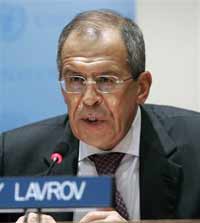Europe lets Russia speak
The Bureau of the Parliamentary Assembly of the Council of Europe (PACE) rejected a proposition to deprive the Russian delegation of its powers. The question, along with the emergency debate on the consequences of the conflict between Russia and Georgia, are the key subjects of discussion at the PACE session which opened September 29 in Strasbourg.

Twenty-four parliamentarians set forth an initiative to deprive the Russian delegation of its powers three weeks ago. The officials were seriously concerned with the conflict between two members of the Council of Europe with South Ossetia. The European Union showed a very negative reaction to Russia’s approval of the independence of Abkhazia and South Ossetia. Russia’s actions were described as a serious violation of basic principles of the Charter of the Council of Europe.
If the PACE had suspended the powers of the Russian delegation, Russian diplomats would have pulled out from the organization, the leader of the Russian delegation in Strasbourg, Konstantin Kosachev said. The initiative was eventually supported by a very small group of parliamentarians. The official added that the document had been signed by those who originally considered it possible to support Georgia in the conflict with South Ossetia – Poland, Ukraine and the Baltic states.
Luc Van den Brande, the Assembly’s Rapporteur for the Russian Federation, was certain that the Russian diplomats would not be deprived of their rights to vote.
In the meantime, Russia’s Minister for Foreign Affairs Sergei Lavrov said during his speech at the session of the UN General Assembly that the future of the people of Abkhazia and South Osseita had been secured with the agreements which Moscow signed with the two nations. Georgia, the minister said, lost all the rights for the two republics when it bombed Tskhinvali at night.
Lavrov specified that the recognition of South Ossetia and Abkhazia became the only possible measure to ensure the security of the two countries and the survival of their nations. The minister referred to the historical experience of the two republics, when Georgian leader Zviad Gamsakhurdia demanded all Ossetians be deported to Russia in 1991 and eventually unleashed the war against them. The war was stopped at the expense of many human lives, and peacemaking mechanisms were subsequently created with the support and approval of the UN and the OSCE. The incumbent Georgian administration, the minister added, had been running a political course to undermine those mechanisms.
Lavrov urged the UN to take measures to prevent the use of mass media outlets in the propaganda of war and hostility. “The distortion of reality complicates the international efforts taken to regulate conflicts and crises and restores the worst practices of the cold war period. If we do not want to make truth become the first victim of war, one should make adequate conclusions about the principles of the international law which exclude the propaganda of aggressive wars,” the minister said.
Subscribe to Pravda.Ru Telegram channel, Facebook, RSS!




